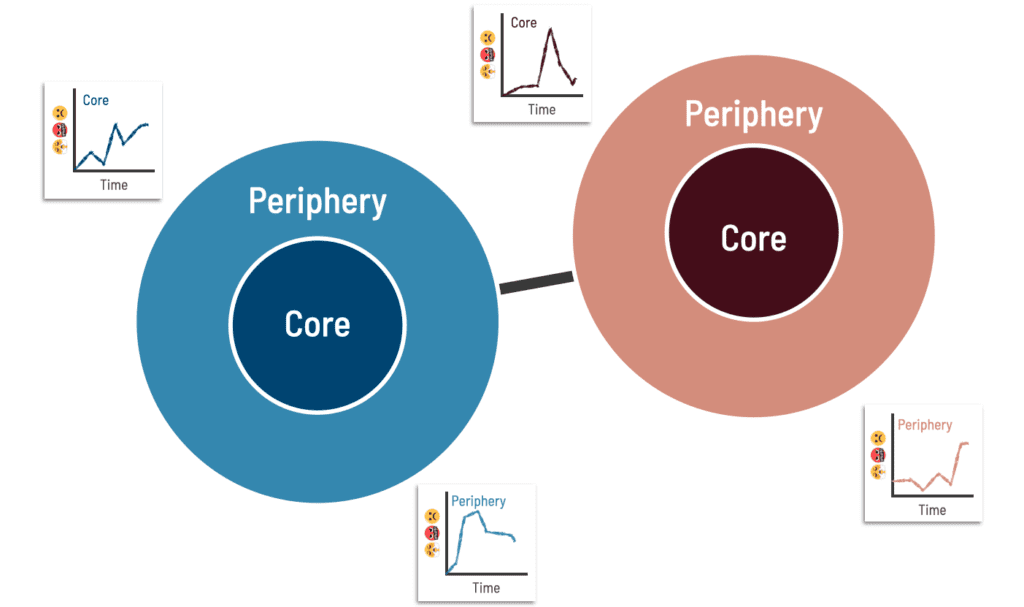On March 17, at a special session of DH Open Office Hours, recipients of NULab Seedling Grants shared their work in a round of short presentations. The panelists were Hanyu Chwe, PhD Student in Network Science, Apryl Williams, Assistant Professor of Communication and Media at the University of Michigan, Ryan J. Gallagher, PhD Candidate in Network Science, Dietmar Offenhuber, Associate Professor of Public Policy and Urban Affairs and Art + Design, Sara Wylie, Associate Professor of Sociology and Health Science, and Kenneth Oravetz, PhD Candidate in English.
Hanyu Chwe and Apryl Williams began the panel with a presentation on their project, Female Experiences on Tinder. Network Science PhD Candidate Ronald Robertson also works on this project. After contextualizing the work with statistics showing the significance of apps like Tinder in present-day dating culture, Chwe described the project’s methodology. Using fake profiles of women with different racial identities, the team has compiled a dataset of the approximately 2,000 messages sent to these profiles. So far, the researchers have separated “low-effort” Tinder messages from more substantive ones and classified these remaining messages into three groups. In response to the absence of scholarship studying the experiences of women of color on Tinder, the research team plans to study racism and colorism on the app through received messages that describe physical attractiveness and convey explicitly sexual messages.
Ryan J. Gallagher spoke about the project, Affective Amplification of Polarized Publics. Associate Professor of Communication Studies Brooke Foucault Welles also works on this project, which relates to her other research on hashtag activism and marginalized communities on social media. This project theorizes social media amplification as consisting of a core (those who are amplified) and a periphery (who amplify the core). Gallagher explained that this theory challenges the idea of slacktivism—that internet activism is lazy and ineffective—by showing that the core cannot exist without the periphery. Affective Amplification of Polarized Publics studies the emotional dimension of amplification in social media. Locating distinct communities of amplification in the United States, the project compares the process of “transfer entropy” of emotions in left- and right-wing communities. The project requires a complex process of sentiment analysis: using machine learning, the researchers create community-adapted sentiment dictionaries and check these computationally-produced numbers through crowdsourced labor. Gallagher shared that the NULab seedling grant is enabling reliable, validated sentiment analysis for the project.

Dietmar Offenhuber and Sara Wylie presented their project, Environmental Enforcement Watch (EEW), an initiative of the Environmental Data & Governance Initiative. Offenhuber explained the project’s goal of tracking ongoing environmental violations in response to the Trump administration’s Environmental Protection Agency (EPA) rollbacks. The EPA keeps public records of inspection and enforcement, but these data are disaggregated and split between agencies. To address this problem, EEW researchers have created custom Jupyter notebooks that pull together data from EPA records available through the Enforcement and Compliance History Online (ECHO) database. In the congressional districts that the research team has studied, 46 of 55 saw an increase in violations of Clean Water Act (CWA) during the Trump presidency, at a 98% median increase in violations in these districts. In the states that EEW studied, there was a 60% median increase in CWA violations. The project also identified declines in inspections and penalties for CWA violation. To take action on their findings about the crisis in CWA compliance, EEW has hosted public events and sent report cards to congressional representatives who oversee the EPA. Offenhuber and Wylie shared that EEW is now working on projects to study contamination by watershed.
Finally, Kenneth Oravetz presented the project Letterpress Goes 3D, which he co-leads with Associate Professor of English Ryan Cordell in collaboration with the College of Arts, Media, and Design Makerspace. Letterpress, Oravetz explained, was the primary printing method from the sixteenth to early twentieth centuries. By today, many letterpress cuts have been lost. Letterpress Goes 3D seeks to solve this problem by making more fonts and images available for use. Specifically, the project uses 3D printing, laser cutting, and other modern technology to reverse-engineer historical woodcuts and metal cuts, and to develop new woodcuts based on contemporary designs. Oravetz recognized the significant contributions of undergraduate assistant Smeet Patel in the project’s work so far. Letterpress Goes 3D will soon publish design and modeling guides on the Huskiana website for public use. In the future, Oravetz and Cordell plan to further hone the 3D printing methodology, solicit designs from others in the Northeastern community, and develop Canvas modules reflecting the project’s work.
Following the short presentations, a lively discussion followed. Participants enjoyed the opportunity to learn about the wide range of research projects at Northeastern that the NULab helps to fund.
The March 17 event was the first of two Grant Recipients Panels that the NULab and DSG will jointly host in Spring 2021. The second panel, featuring Nicole Aljoe and Myojung Chung, will be on April 14. Weekly DH Open Office Hours are organized by the Digital Scholarship Group.
NULab seedling and travel grants are open to Northeastern University faculty and graduate students. During the COVID-19 pandemic, travel grants can be used to cover expenses related to online events. More information about NULab grants can be found on our “Seedling and Travel Grants” page.






